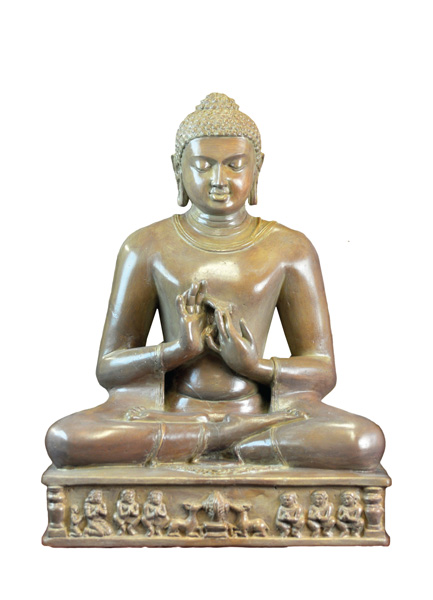Quarter Moon Teaching
“Sow a thought,
and you reap an act;
Sow an act,
and you reap a habit;
Sow a habit,
and you reap a character;
Sow a character, and you reap a destiny.”
– anonymous
This quote may have a Buddhist origin. No one seems to know where it came from, but various Nineteenth Century Western writers referred to it without attribution and it seems now to be variously attributed to each of them, but some think it may be a translation from Chinese, so its resemblance to Buddhist thought might not be a coincidence.
This poem concisely and precisely as pie captures the foundational set of Buddhist teachings on Karma. The word “karma” in Sanskrit, or “kamma” in Pali (which is roughly Sanskrit without r’s), means action, action of all kinds. For instance, you can recognize this root in the Noble Eightfold Path in which Pali “Samma Kammanta” is English “Right Action.”
Traditionally the central concern of karma in India, before and after the Buddha, has been the relationship between our present actions and our future welfare or destiny. The Sanskrit word for action is Karma. For the brahmins since before the Buddha the ritual aspects of action were the determinants of destiny, and knowledge of the rituals gave brahmins their authority. The Buddha rejected this and stressed the volitional or intentional aspects of karma as the determinants of future welfare, character or destiny.
So the Buddha often used “karma” in a technical sense as for something having two components: Intention and Action, that is, why you do something, and what it is you actually do. For the Buddha intention is critical: If no intention is present, for instance in the case of killing a bug accidentally, there is no karma at all:. It matters to the world, but not generally to the character, welfare or destiny of the actor. But if intention is present, then the nature of the intention will help shape character and destiny.
 There is a great assortment of intentions, but the Buddha recommended avoidance of those rooted in Greed, Hatred or Delusion, because actions that have these as intentional components (1) are likely to hurt others, (2) tend to make us greedy, hateful and deluded people and (3) bring us personal suffering, if not now then in the future. Through karma we not only make the world, we also make ourselves. The more you steal the more you become a thief, the more you kill the more you become a killer, the more you gossip the more you become a gossip. Actions become habits. These habit patterns form who we are, and even manifest themselves in characteristic physical attributes such as beauty or ulcers. In fact the Buddha often referred to a Law of Karmic Payback whereby we reap what we sow in some rather specific ways. Our character propels us forward into life circumstances, into new rebirths, into states of woe or bliss and eventually into nirvana, that is, the ending of Karma.
There is a great assortment of intentions, but the Buddha recommended avoidance of those rooted in Greed, Hatred or Delusion, because actions that have these as intentional components (1) are likely to hurt others, (2) tend to make us greedy, hateful and deluded people and (3) bring us personal suffering, if not now then in the future. Through karma we not only make the world, we also make ourselves. The more you steal the more you become a thief, the more you kill the more you become a killer, the more you gossip the more you become a gossip. Actions become habits. These habit patterns form who we are, and even manifest themselves in characteristic physical attributes such as beauty or ulcers. In fact the Buddha often referred to a Law of Karmic Payback whereby we reap what we sow in some rather specific ways. Our character propels us forward into life circumstances, into new rebirths, into states of woe or bliss and eventually into nirvana, that is, the ending of Karma.
So, the focus of Buddhist practice, that is, of the Noble Eightfold Path, is the choice of that first thought from which, as the poem tells us, everything else follows. Understanding what else follows is important in understanding the choice we make in the first thought. I herewith begin a possibly lengthy series of Uposatha Day teachings on the topic of this little poem. It will take us from Karma past Rebirth and on to Nirvana.
This is a challenging topic that is often poorly understood. Aspects of this topic are also quite controversial in the West. Western minds, particularly the Law of Karmic Payback and Rebirth. This will require some careful consideration of a range of viewpoints.
… to be continued

Leave a Reply